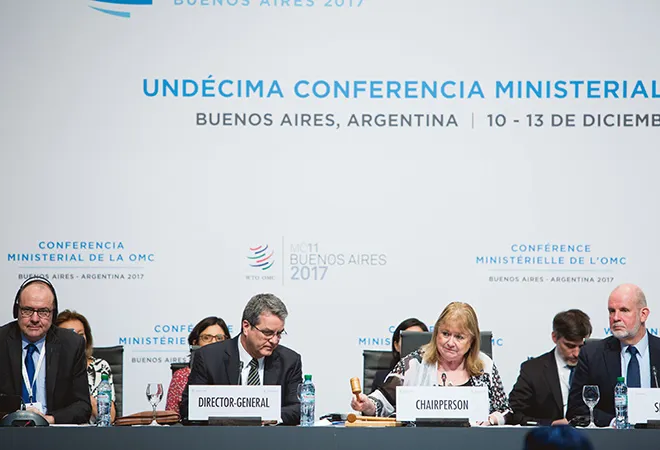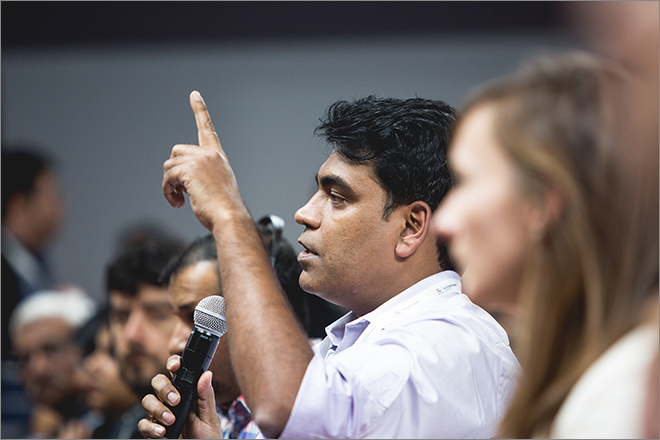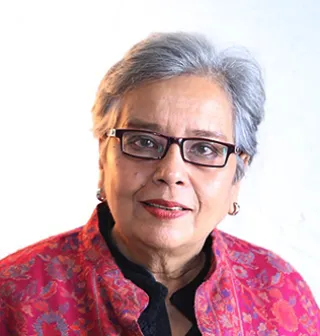-
CENTRES
Progammes & Centres
Location
India has to compete with ASEAN and others around the world in increasing its share of global trade. It is promoting its own free trading arrangement with its immediate neighbours. It already has FTAs — if it left the WTO, no great harm would come to it in the areas of trade and investment.

The 164 member World Trade Organization held its Ministerial meeting in Buenos Aires, Argentina recently which ended in an impasse. It is the second time that a WTO ministerial meeting ended without any positive outcome or a way forward. The first time was the meeting in Cancun in 2003. The main reason for its failure was the lack of consensus on some of the controversial issues and the US becoming more and more belligerent in its interventions, especially on questions raised by India and China and other developing countries.
It is becoming increasingly apparent that the Geneva based 22-year-old organisation, which is supposed to do the important work of trade monitoring and contribute to the effective functioning of the multilateral trading system, is increasingly toothless and is succumbing to the pressure of the developed countries, especially the US. It, however, still remains the primary instrument governing a rules-based world trading system.
Recently, the US Trade Representative, Robert Lighthizer, said that the WTO was losing its essential focus on negotiations and was becoming a litigation centred organisation which has some truth to it. It is true that the trading arrangements between countries is increasingly bypassing the WTO and formulating their own agreements.
In the past, there was a sympathetic treatment towards developing countries like India, which got special and differential treatment at the WTO which gave them more time and leeway to comply with the WTO rules, but now the US has begun to question this special treatment because countries like India and China are considered large Emerging Economies due to the giant size of their population and hence GDP. India’s Commerce Minister Suresh Prabhu rightly pointed out that India has to be treated differently because it has to take care of 600 million people who can be considered as poor.
Read | India & China: On the same side at the WTO
At the Buenos Aires meeting, India sought a permanent solution to its public stock holding issue because currently it is under the peace clause put in place at the Bali Ministerial meeting of 2013 by which India continues to undertake stockholding of foodgrains equal to 10 per cent of the value of its food production for meeting its food security requirement. But a permanent solution which was promised has not been delivered at the Buenos Aires 11th Ministerial Conference (MC11), mainly because the US blocked it.
At the Buenos Aires meeting, India sought a permanent solution to its public stock holding issue.
Public stock holding is very important for India’s food security and if the issue is not settled, then it may have to roll back its Food Security Act which means compromising on food provision for the poor. There has, however, been no loss of status quo on stock holding and India can continue with its support price programme. But there has to be a permanent solution on how the Minimum Support Price is to be fixed because earlier according to the WTO’s Agreement on Agriculture, the MSP would have to be calculated on the basis of price of foodgrains in 1986-88 and the total subsidy would have to be below 10 per cent of the total value of production. India strongly disputed this formula because the current prices are much higher and hence the total MSP given as subsidy would also be higher. But fortunately, India’s food subsidy is still less than 10 per cent of the total value of production.
In agriculture, India and China have opposed the huge production related price distorting subsidies given by the developed countries like the US and the EU to their farmers which make their products cheaper as compared to produce from developing countries, making it harder for them to compete with the advanced countries. US alone gives around USD 150 billion in direct subsidies to farmers which come under the Green Box, according to the rules of GATT, and hence allowed. India’s MSP is considered trade distorting and comes under the Amber Box and India is mandated to reduce it. But this issue of high subsidies given by developed countries to their agriculture was not addressed at MC11 even though it has been raised in previous meetings of the WTO. In general, the US refused to have any dialogue on agricultural reforms.
Other issues which never cropped up before were also raised like the freeing of e-commerce and investment facilitation by a group of countries. China proposed freeing of e-commerce, but India rightly objected. China wants to remove all duties on e-commerce — something which is not feasible in India’s case because India’s digital penetration is not as deep as China’s and freeing of e-commerce will not help the MSMEs as they will not be able to compete with countries with deeper internet penetration which lead to their having better access to international markets.
 Source: WTO/Cuika Foto/CC BY-SA 2.0
Source: WTO/Cuika Foto/CC BY-SA 2.0
Regarding investment facilitation, India has got its own new model investment code which does not allow multinational companies to take the government to international courts before it has taken recourse to the domestic dispute settlement bodies for a period of at least five years. This is because, in the past, the government of India has been taken to international arbitration courts on multiple occasions.
India has got its own new model investment code which does not allow multinational companies to take the government to international courts before it has taken recourse to the domestic dispute settlement bodies for a period of at least five years.
In the case of fisheries also, China and India did not make commitments to eliminate fisheries subsidies on ‘illegal fishing’ because of the livelihood of large number of fishermen is involved.
The Doha Development Agenda, which the Indian government has been keen to promote and which is based on multilateralism, has been put on hold much to the chagrin of many developing countries comprising the Group of 33.
So what is it that the WTO has achieved? It has become only a dispute settlement body and even that role has been blocked by the US as it has refused to participate in the nomination of judges to the appellate body, creating a paralysis in the WTO’s dispute settlement system. Members are usually appointed by consensus and the US is an important member.
Throughout its existence, the WTO has been dominated by the developed countries, with US playing an important role. From supporting trade and investment liberalisation in the world and insisting on tariff reductions for prying open developing country markets, the US has now turned protectionist. It blocked the Trans Pacific Partnership Agreement and wants to renegotiate the North Atlantic Free Trade Agreement with Canada and Mexico in a bid to realise Trump’s goal of America First. China has emerged as a supporter of globalisation and free trade as it still remains the biggest exporter in the world.
India on the other hand has to compete with all the members of ASEAN and others around the world in increasing its share of global trade. It is promoting its own free trading arrangement with its immediate neighbours. It already has FTAs with a number of countries and is a member of several other regional groupings. If it left the WTO — no great harm would come to it in the areas of trade and investment. It will be independent of the rules of public stockholding restrictions which are unjust towards the large number of poor in India needing food security. It will be able to undertake reforms at its own pace and address the needs of the poor farmers and small and micro enterprises. India could have its own agenda of duty reduction on various sensitive items because it too like the US is interested in Make in India policy which has to give priority to its own industries first.
The views expressed above belong to the author(s). ORF research and analyses now available on Telegram! Click here to access our curated content — blogs, longforms and interviews.

Jayshree Sengupta was a Senior Fellow (Associate) with ORF's Economy and Growth Programme. Her work focuses on the Indian economy and development, regional cooperation related ...
Read More +
David Rusnok Researcher Strengthening National Climate Policy Implementation (SNAPFI) project DIW Germany
Read More +